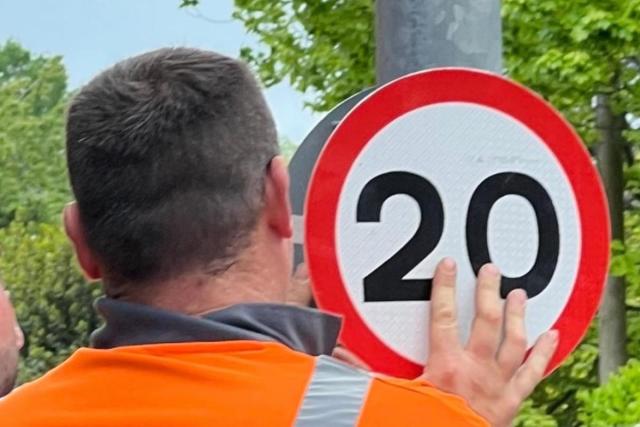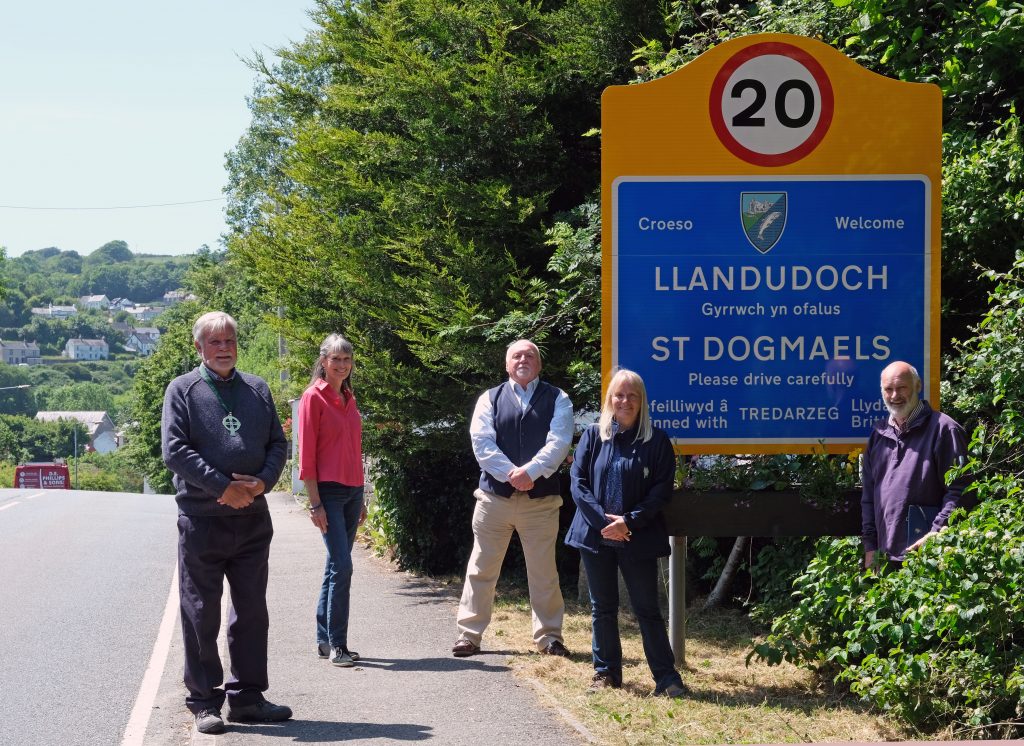featured
Wales to reduce speed limit to 20mph in built-up areas from Sunday

WALES will introduce a new default speed limit of 20mph (32km/h) for residential roads from Sunday, making it the first UK nation to make such a change. This follows Spain, which has already adjusted its national speed limits in 2019. However, drivers are being urged not to rely solely on their satellite navigation systems for the speed limit updates, as some GPS firms have indicated that immediate updates might not be possible.
What This Means for Drivers
The new law will affect around 35% of Welsh roads with lamp-posts no more than 200 yards (183m) apart. Notably, since this will be the national speed limit, 20mph signs will be unnecessary on those roads unless the limit changes. But while police have noted that enforcing the new speed will be a “last resort” in the early stages, fixed speed cameras will not show such leniency.
Simon Williams, of the RAC, advised drivers to stay updated. “Until sat-nav systems have been fully updated, they shouldn’t rely on them to know what the speed limit is on any particular stretch of Welsh road,” he stated.
Political Reactions

The speed limit change has spurred varied responses from politicians. House of Commons leader Penny Mordaunt criticised the move, terming it “insane”. Mordaunt suggested that the Labour party was punishing motorists. However, Lee Waters, the deputy climate change minister for Wales, described Mordaunt’s comments as a “pantomime”.
Economic and Safety Implications

First Minister Mark Drakeford highlighted the safety benefits, stating that while it may take an extra minute for journeys, the change could save ten lives in Wales each year. However, the Welsh Conservatives have drawn attention to Welsh government documents which estimate that the speed change could cost the Welsh economy between £2.7b and £8.9b due to increased journey times. Yet, Mr Drakeford counters that the NHS could see savings of £92m annually.
Historically, more people were severely injured or killed in 30mph zones in Wales than in any other zones. Safety campaigners, Brake, have emphasised that the risk of fatality is five times higher at 30mph compared to 20mph.
Which Roads Will Change?
Of the 22,000 miles of road in Wales, an estimated 7,700 miles will change from 30mph to 20mph. About 30,000 road signs are set to be replaced.
However, not all 30mph roads will experience this reduction. Local authorities have the discretion to maintain the 30mph speed limit where they can provide evidence that such speeds are safe and won’t endanger pedestrians and cyclists.
Controversial Change?
The speed limit adjustment has seen its share of controversy. A majority of respondents to a Welsh government-commissioned consultation were against the change. Furthermore, the Welsh Conservatives have voiced strong opposition.
Mark Drakeford admitted the change would require adjustment, likening it to the introduction of the breathalyser. He expressed hope that, over time, the community would see the benefits of the reduced speed in terms of safety.
As Wales moves forward with this landmark change, it remains to be seen how smoothly the transition will be and what the long-term impacts, both positive and negative, will be.

featured
Culture of fear exposed in damning fire service report

Haverfordwest ‘at the centre’ of Mid and West Wales Fire Service scandal
A DAMNING independent cultural review into Mid and West Wales Fire and Rescue Service (MAWWFRS) has laid bare widespread bullying, harassment, and a culture of favouritism – issues long suspected at Haverfordwest Fire Station, which was at the heart of controversy following the dismissal of Watch Manager Phil Irving in 2024.
The findings, published this month, confirm what many firefighters have been saying for years – that nepotism, intimidation, and a lack of accountability have created a toxic working environment across the service. The review follows a series of scandals, including Irving’s dismissal, which rocked Haverfordwest Fire Station and raised major concerns about the culture within the service.
“Operational boys’ club” exposed
The review describes MAWWFRS as an “operational boys’ club” – where personal connections with senior leaders, rather than skills or experience, dictate career progression. Staff reported that friendships with management led to promotions and special treatment, while others faced discrimination or were pushed out for speaking up.
One firefighter told investigators: “Help from the old boys’ club means promotion for many operational personnel.”
Another stated: “There is a pernicious cliquey culture within the organisation. Favouritism and nepotism thrive – if you are friends with the right people, you are untouchable.”
These findings mirror concerns raised in 2021, when The Herald revealed serious complaints about bullying and mistreatment at Haverfordwest Fire Station. At the centre of those allegations was Watch Manager Phil Irving, who was accused of intimidating staff, creating a culture of fear, and forcing multiple colleagues to request transfers just to escape his leadership. Despite repeated complaints, it took years for MAWWFRS to take action, and it was only in 2024 that Irving was dismissed.

Years of bullying ignored
The review found that bullying and harassment remain rampant, with 47% of staff experiencing it since 2021, and over half (54%) witnessing it firsthand. However, despite the scale of the problem, most staff do not report it, fearing retaliation or career damage.
One employee stated: “Speaking up means you’ll be marked. It’s easier to keep your head down.”
Another added: “If you’re not in the right circles, it doesn’t matter how good you are – you won’t go anywhere.”
Leadership failures and a lack of accountability
The review heavily criticises senior management, describing a lack of accountability at every level. Disciplinary procedures were found to be biased, unprofessional, and ineffective, with some managers protecting each other rather than enforcing proper standards.
This was evident in the handling of Phil Irving’s case. Despite numerous complaints and repeated concerns from colleagues at Haverfordwest Fire Station, it took years for leadership to act, leaving firefighters in a toxic working environment for far too long.
Even after Irving’s removal, firefighters remain sceptical that real change will happen.
One told The Herald: “People like him were allowed to thrive because the whole system is broken. Unless they fix leadership, it will happen again.”
Fire service pledges change – but is it too late?


In response to the report, Chief Fire Officer Roger Thomas admitted the findings were serious, stating: “I accept the findings and recommendations within the review, which support my ambition to improve the culture of our service.”
However, many remain unconvinced that MAWWFRS will follow through with genuine reform. The cultural issues are deep-rooted, and Haverfordwest Fire Station is just one example of a wider problem across Mid and West Wales.
While some believe that Irving’s dismissal was a step in the right direction, others argue it was too little, too late. The challenge now for MAWWFRS leadership is whether they will take real action – or whether this report, like so many before it, will simply gather dust while the same toxic culture continues.
featured
The Teifiside Aggravator: Satirical news outlet challenges local journalism in Cardigan

HEARD the story about the ‘major’ car crash in Tesco’s car park, Cardigan? The one where no one was hurt and no vehicles were damaged?
Or how about the story where a Cardigan street was recently pronounced as having the slowest average broadband speed in the whole of Wales? Except the ‘street’ is nowhere near Cardigan at all, but a hefty seven miles away – in Ponthirwaun.
Now, as hundreds of disgruntled Cardigan newspaper readers are becoming increasingly disillusioned at the ‘click-bait stories’ appearing in their 158-year-old local paper, another online publication is proving a farcical force to be reckoned with.
Enter the ‘Teifiside Aggravator’.
This week The Pembrokeshire Herald met up with the Aggravator’s creator and editor for an exclusive insight into what prompted its heady arrival into the ever-changing world of online media.
“It all started when I began to realise that so many of the news articles in the local paper were just pure nonsense,” he said. (And before anyone starts wondering who was being interviewed, the editor wishes to remain anonymous. All we know is that he’s male, 24 years old, and has lived ‘near Cardigan’ for the past 15 years).
“Take that car crash story in Tesco’s car park … it was a nothing story, because nothing had happened. It was just a tiny little bump. And yet it hit the newspaper with a big headline.
“I also began realising how much misinformation is being fed to each and every one of us, and the social implications that this means as a whole.
“Globally it’s such a huge issue, so I wanted to see what the limits are.
“This week many of us have been affected by the power cuts and I’ve been offline for two days. And this made me realise that the global issues which we’re bombarded with are suddenly irrelevant – the most important things are the things that are immediately around us.
“And it’s not just a manipulation by the media but all those other influencers, including the Government and everyone with a lot of reach.”
Which brings us neatly back to the Teifiside Aggravator.
Its first story, published on November 25, 2024, told of the controversial plans to replace Llechryd’s historic bridge with a £1.5 million flood-resilient structure built by a Chinese construction firm. Then there was Emyr the heroic sheep (soon to be honoured in the local Eisteddfod), who saved the life of a six-year-old child on a farm in Synod Inn closely followed by Cardigan’s acute sourdough shortage coupled with the locals’ failure to put the lids back on their marmite pots. Last but by no means least came Cardigan’s ‘bauble-based blunder after borough bigwigs bungled their budget with its plastic Christmas tree (Don’t you just love the Aggravator’s use of alliteration?)
The articles are beautifully composed, highly entertaining and ever-so-blatantly tongue in cheek, thanks to the candid thought processes of the editor.
“Very single article is written by AI,” he laughs. “Obviously the ideas are all mine and I give AI very firm instructions on how they should be written, usually with a fair bit of alliteration and the occasional stupid word dropped in. It usually takes around ten takes before I’m happy with the story but the interesting thing is, I’m still not sure whether everyone who reads my stories realises they’re fake.
“For example, people shared their disappointment over the Christmas tree story and the town council’s decision to erect a fake tree instead of a real one, and loads more people were extremely upset at the fact that Lechryd bridge was going to come down.

“But once people figure out that the stories are false, they find them funny. And to date, I haven’t seen anything negative in the way they’re being presented.”
One can’t help comparing the Teifiside Aggravator concept with that of Barri Bryth, Ceredig Pysgod-Jones and Gito Goch who are the unstoppable reporters responsible for Pembrokeshire Cachu News and its satirical news sensations. Since launching in 2020, the online news site has amassed over 10,000 followers.
“Yes, it’s quite entertaining to see people fall for my stories and believe that they’re true, but it’s made me realise that these people are no different to me. There’s probably someone out there laughing at my expense when I read what they’ve written, believing it to be true.
“Misinformation is such a big thing at the moment, with people telling us what we should be eating or who we should be supporting or not supporting.”
Speaking with the Aggravator, it soon becomes apparent that whoever is responsible for its creation is an exceptionally logical, clear-minded character. Despite still being offline as a result of the power cut, he was already working on his next story.
“Every story is about current events, but how they are presented may differ from reality. And this is because I feel that we should be focussing on the things that are directly in front of us in real life, and stop allowing ourselves to consume anything without critical thinking.
“At the end of the day, virtually everything around us is manipulated, even the article that you’re reading at the moment. The person who wrote it may not have understood everything in the context of how it was said, or perhaps the person who was interviewed just gave out snapshots of what was meant.”
Meanwhile, even though the Aggravator’s origins were inspired by the shortfallings of the local newspaper, the editor has now left those shortcomings firmly behind.
“I don’t care about the local newspaper any more – I’ve left that one behind,” concluded the Aggravator.
“ All I’m interested in is opening people’s minds to what’s going on in the information we’re being given on a constant basis.”
featured
Teenager killed herself after ten months of hell, says heartbroken mum

MEGAN EVANS was just 14-years-old when she tragically ended her life on February 7, 2017, after enduring ten harrowing months of relentless bullying—both online and in person. That day, she received a devastating message on Snapchat that read: “Go kill yourself.” Hours later, her family discovered her lifeless in their bathroom.
Last week, Pembrokeshire Coroner Paul Bennett ruled Megan’s death a suicide, attributing it to personal struggles, including her boyfriend’s infidelity and her father’s illness. He dismissed the extensive bullying Megan endured as ‘banter,’ stating that phrases like “go kill yourself” were, in his view, “regular use” online. “What may be bullying to one could be banter to another,” he remarked.
Megan’s mother, Nicola Harteveld, has voiced her deep disappointment at the coroner’s findings, questioning his understanding of the destructive power of social media and the pervasive dangers it poses to vulnerable young people. “At the time of her death, Meg didn’t know where to turn,” Nicola told The Herald. “She was like a caged animal.”
“At the time of her death, Meg didn’t know where to turn,” she said. “She was like a caged animal.
“And the people around her – her friends – could see the detrimental effect it was having on her.
“She was wise beyond her years, to the extent that if she was going to do something, she would do it to the best of her ability. If she didn’t give it 110%, then she wouldn’t do it.
“When I found out that she had killed herself, I knew categorically that this was what she wanted to do. And it was the result of ten months of hell. Ten months of being bullied and ten months of gradually losing trust in everything around her. As a result of what was happening, Megan lost trust in her school, and this was the catalyst of her not being able to trust in me.”
Nicola began to notice that things were not right with her daughter in May 2016, which was nine months before her death.
“It was the Monday of half term, she’d gone out with her friends but she phoned me, crying. She said, ‘Come and get me, I’m scared’.
“The girls had collared her down Milford Beach and Meg was hysterical. She later told me that they’d done the same thing to her the previous Saturday…they’d hammered her, and now they were doing the same thing to her again.”
Nicola Hartefeld collected Megan from the beach and immediately rang the police. Following a police interview, the girls responsible for the assault were given a police caution.
Matters continued to deteriorate throughout the autumn term when the bullying to which Megan was being subjected began affecting her conduct and her concentration in the classroom. Between September and February, there were nine recorded incidents, including C1 and C2 warnings and detentions. This, alleges Nicola, was because Megan was being ‘picked on’ by staff for her incorrect school uniform as well as other pupils.
“Before this, Meg had never been in trouble, yet the coroner failed to see this.
“In January, I noticed she wasn’t eating properly…she was just eating junk food and I heard from her friends that even when she was eating something small, like a sandwich, she’d always share it. She was losing weight.
“So I decided that Megan should come home for lunch every day.”
But on January 13, Megan failed to appear.
“I texted her to find out what had happened, and she said that she had been put in detention. But it was lunchtime so this should never have been allowed to happen. I was furious.
“Megan was being prevented from coming home to eat her lunch.”
Following a verbal altercation between Megan’s father, Sean Evans, and school staff, Megan was finally allowed to leave the school premises to eat her lunch.
Four days later, Megan once again rang her mother in tears after being told she couldn’t attend a careers trip to Pembrokeshire College with the rest of her Year 9 pupils.
“Megan didn’t have the permission slip signed so I went straight up to the school, at around 9.20am, to sign it.

“But one of the teachers told me that Megan was unable to go as she didn’t have parental permission. They were adamant about this. And yet there I was, her mother, giving her full permission. Megan really wanted to go on that trip with everyone else but she couldn’t.
“For the rest of that week she was off school with chest pains and anxiety.
“Megan was always a bright, clever girl, but by now she hated being in that school environment.
“I discovered that she was walking out of virtually every single lesson, in tears. There had been this massive decline and yet the school did nothing to find out why this was happening. Instead they were chipping away at her, constantly.”
Finally on February 7, 2017, Megan received a Snapchat message from a pupil in another school. The message read ‘Go kill yourself’. Later that evening 14-year-old Megan was found hanging in her parents’ bathroom.
“The day Meg died was the day that our relationship with her school ended,” continued Nicola. “The first we heard from them following her death was a solicitor’s letter, so they had closed ranks.
“Since her death, I’ve spent the last seven years doing my utmost to raise awareness that it’s not ok to use social media to bully, to condemn or to antagonise others. I
“I’ve tried to show how important it is to look out for warning signs that things may be going wrong, I’ve tried to break the stigma and encourage young people to speak out and express the ways in which they are being bullied.
“But with one fell swoop, the coroner stood on all those efforts and quashed them. He said that those words sent to Megan and all the bullying she’d had to endure amounted to banter and nothing more.
“But I know wholeheartedly that words can kill, because all those words killed my daughter. And by describing them as banter undermines their power.”
Nicola’s sentiments are endorsed in an extract found in Megan’s diary.
“People say it was a joke, but sometimes it goes too far,” she wrote during the last weeks of her life.
“In my opinion, the findings of Megan’s inquest are an injustice to every young person who’s suffering from mental health as they imply that if someone tells you to go kill yourself, then as long as you can stand up for yourself, then you won’t be emotionally affected by it.
“The coroner was negating any responsibility from the people who undermined her throughout those last months of her life.
“As a result, Megan’s legacy has been destroyed.”
-

 Health5 days ago
Health5 days agoConsultation reveals lack of public trust in health board
-

 News6 days ago
News6 days agoCaldey still unsafe, survivors warn — despite Abbey’s reform claims
-

 Community6 days ago
Community6 days agoPembrokeshire students speak at national Holocaust Memorial Day event
-

 News6 days ago
News6 days agoKurtz raises Gumfreston flooding in the Senedd as petition deadline nears
-

 Community7 days ago
Community7 days agoStorm Chandra: Morning impacts across Pembrokeshire
-

 Entertainment7 days ago
Entertainment7 days agoRapunzel brings festive magic to Torch Theatre
-

 Crime7 days ago
Crime7 days agoMan denies murdering brother as jury hears of ‘ferocious attack’ at Morriston flat
-

 Crime4 days ago
Crime4 days agoPembroke man accused of child sex offences sent to Swansea Crown Court

































